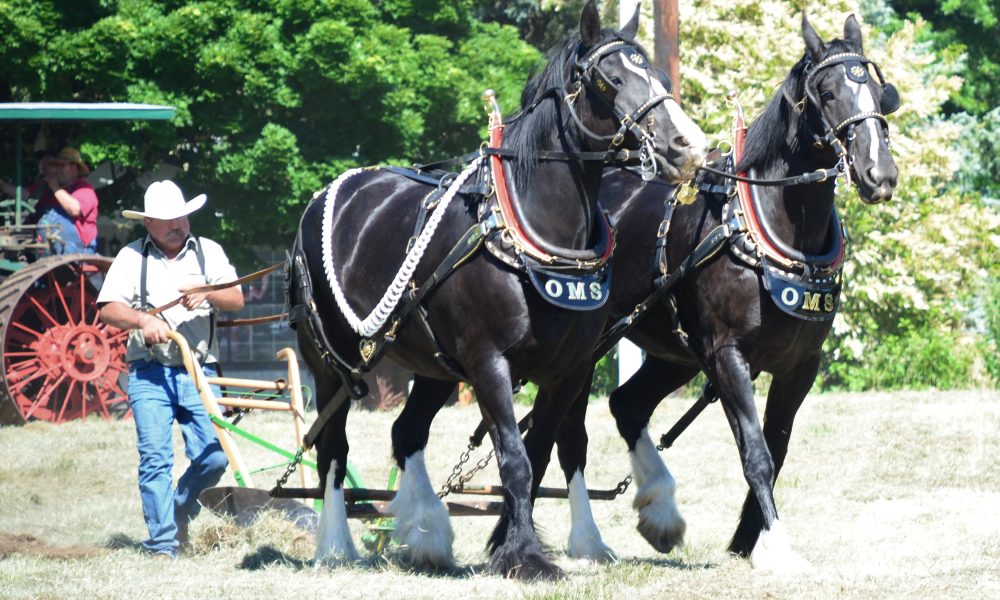
Duane van Dyke hand plows the future site of the Chemeketa Community College Agriculture Complex with work horses Clare and Sophie at a groundbreaking event June 11, 2019 (Rachel Alexander/Salem Reporter)
A bare grass field on the east end of Chemeketa Community College’s Salem campus will become a complex for the college’s agricultural programs in late 2020.
College leaders on Tuesday kicked off construction for the $12 million project, which they said will expand agricultural programs and serve as a community “hub” for agricultural training.
“We want to be able to inspire collaboration and innovation for agriculture,” said President Julie Huckestein.
The complex will include 15,000 square feet of indoor classrooms and offices in addition to outdoor garden and hoop house space.
At the groundbreaking, college leaders, faculty and agricultural business and community members watched as Duane van Dyke of One Mile Shires farm plowed the now-empty field using a John Deere walking plow and his work horses, Clare and Sophie.
Following van Dyke came a steam engine from Powerland Heritage Park, then an air-conditioned, computer-guided tractor to show the evolution of farming.
College board members, administrators and faculty lined up with shovels, though they weren’t able to turn over the ground after a long day under hot sun. But they toasted to the new project after Jessica Howard, the college’s incoming president, used a machete to slice open a bottle of the college’s own sparking wine.

Incoming Chemeketa president Jessica Howard sabers a bottle of college sparkling wine at the groundbreaking ceremony. (Rachel Alexander/Salem Reporter)
The investment comes as the college has faced nearly a decade of falling enrollment and is projecting a further 2 percent decrease next year. The 2019-20 budget of about $294 million included a tuition increase and several staff layoffs.
Enrollment in agricultural programs has remained steady over that time, with about 160 students per year in the college’s horticulture program, and 70 to 80 local farms enrolling in agribusiness management.
Improvements to agricultural facilities have been on Chemeketa’s wish list for years, said Holly Nelson, an executive dean who oversees agricultural programs and academic progress.
College leaders received $6 million in state funding toward the project and the remainder of the money is coming out of the college’s capital development fund.
Nelson said the college wants to invest in programs with potential for growth where classes and training could better be aligned to industry needs.
“The building has to handle the highs and lows” of enrollment, she said. “This is a great way to prepare for five years from now when the enrollment could be sky high again.”

Chemeketa President Julie Huckestein shovels dirt during a groundbreaking ceremony of the college’s new agricultural complex (Rachel Alexander/Salem Reporter)
When completed, the complex will house Chemeketa’s horticulture program, which awards degrees, and the agribusiness management certificate, which trains local farmers and farm employees on bookkeeping.
That program is usually full because of limited space in current buildings, said Jessica Sandrock, the college’s director of wine studies and agricultural sciences.
The horticulture program is expanding in the fall to include a transfer degree option to Oregon State University.
Currently, horticulture operates out of three portable classrooms on the opposite side of campus from the hoop houses, garden and tool shed where students learn hands-on skills. Those facilities are in a parking lot.
“We’re very limited with our current facilities,” said Sandrock. The complex would include several labs for better research and hands-on training, including a lab to study cultivation for woody ornamental plants and an organic vegetable garden.
As part of the expansion, Chemeketa will add more agricultural programs, Nelson said. Exact programs won’t be finalized for about a year but could include topics like small farms and nursery management.
In a 2016 application for funding, Chemeketa leaders predicted the complex would boost enrollment in existing agriculture programs 25% over five years, and new offerings would add another 25% increase.
Community programs, including OSU’s Extension Service and Marion-Polk Food Share, could use the building for community classes.
Reporter Rachel Alexander: [email protected] or 503-575-1241.
JOIN US: FACEBOOK and TWITTER.
SUBSCRIBE AND DRIVE LOCAL REPORTING — For $10 a month, you get breaking news alerts, emailed newsletters and around-the-clock access to our stories. We depend on subscribers to pay for in-depth, accurate news. Help us grow and get better with your subscription. Sign up HERE.

Rachel Alexander is Salem Reporter’s managing editor. She joined Salem Reporter when it was founded in 2018 and covers city news, education, nonprofits and a little bit of everything else. She’s been a journalist in Oregon and Washington for a decade. Outside of work, she’s a skater and board member with Salem’s Cherry City Roller Derby and can often be found with her nose buried in a book.









